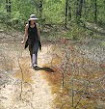Case for inoculating urban trees with a diversity of beneficial mycorrhizal fungi:
"Urban trees, in particular, are subject to many environmental stresses. Many harmful chemicals are deposited on the trees and directly on the soil, and the ground they are growing on is typically heavily compacted. Also, let's face it, they don't exactly grow on great quality soil. Furthermore, young tree seedlings and sapling growing in nurseries are typically fertilized, which further eliminates many beneficial mycorrhizal fungi. Some of our preliminary research in the cities of Guelph and Toronto shows that trees in streetscapes are heavily infected by mycorrhizal fungi (a good thing), but fungal diversity is very low (not a good thing). Many species normally associated with these trees in forests have become extinct from urban environments.
In a recent field-trial we tried to bring back some of these fungal species. We inoculated black maples with a cocktail of mycorrhizal fungi to see if this would improve their growth. During the first year, there was no sign that inoculation helped at all. All trees were similar is size and overall health, and we began re-evaluating our story. But then came the big summer drought of 1998. This placed a lot of stress on our experimental trees, and right now, the inoculated trees are the only ones that have survived. This suggests that things may be fine during normal years, but that this diversity of fungi may be important during years with extremes in climate. As climate is expected to be less predictable in the coming years, mycorrhizal inoculations may prove to be more necessary."
*
Care about


No comments:
Post a Comment